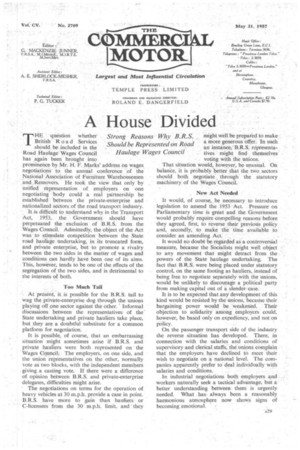A House Divided
Page 31

If you've noticed an error in this article please click here to report it so we can fix it.
THE question whether British Road Services • should be included in the• • Road Haulage Wages Council has again been brought into prominence by Mr. H. F. Marks' address on wages negotiations to the annual conference of the National Association of Furniture Warehousemen and Removers. He took the view that only by unified representation of employers on one negotiating body could a real partnership be established between the private-enterprise and nationalized sectors of the road transport industry.
It is difficult to understand why in the Transport Act, 1953, the Government should have perpetuated the exclusion of B.R.S. from the Wages Council. Admittedly, the object of the Act was to stimulate competition between the State road haulage undertaking, in its truncated form, and private enterprise, but to promote a rivalry between the two sides in the matter of wages and conditions can hardly have been one of its aims. This, however, tends to be one of the effects of the segregation of the two sides, and is detrimental to the interests of both.
Too Much Tail At present, it is possible for the B.R.S. tail to wag the private-enterprise dog through the unions playing off one sector against the other. Informal discussions between the representatives of the State undertaking and private hauliers take place, but they are a doubtful substitute for a common platform for negotiation.
It is possible, of course, that an embarrassing situation might sometimes arise if B.R.S. and private hauliers were both represented on the Wages Council. The employers, on one side, and the union representatives on the other, normally vote as two blocks, with the independent members giving a casting vote. If there were a difference of opinion between B.R.S. and private-enterprise delegates, difficulties might arise.
The negotiations on terms for the operation of heavy vehicles at 30 m.p.h. provide a case in point. B.R.S. have more to gain than hauliers' or C-licensees from the 30 m.p.h. limit, and' they Strong Reasons Why B.R.S. might well be prepared to make Should be Represented on Road a more generous offer. In such an instance, B.R.S. representa Haulage Wages Council tives might find themselves . voting with the 'unions.
That situation would, however, be unusual. On balance, it is probably better that the two sectors should both negotiate through the statutory machinery of the Wages Council.
New Act Needed It would, of course, be necessary to introduce legislation to amend the 1953 'Act. Pressure on Parliamentary time is great and the Government would probably require compelling reasons before they agreed, first, to reverse their previous polity and, secondly, to make the time available to consider an amending Act.
It would no doubt be regarded as a controversial measure, because the Socialists might well object to any movement that might detract from the powers of the State haulage undertaking. The fact that B.R.S. were being placed under statutory control, on the same footing as hauliers, instead of being free to negotiate separately with the unions, would be unlikely to discourage a political party from making capital out of a slender-case.
It is to be expected that any development of this kind would be resisted by the unions, because their bargaining power would be weakened. Their objection to solidarity among employers could, however, be based only on expediency, and not on policy.
On the passenger transport side of the industry the reverse -situation has developed. There, in connection with the salaries and conditions of supervisory and clerical staffs, the unions complain that the employers have declined to meet their wish to negotiate on a national level. The companies apparently prefer to deal individually with salaries and conditions.
In industrial negotiations both employers and workers naturally seek a tactical advantage, but a better understanding between them is urgently needed. What hasalways been a reasonably harmonious atmosphere now shows signs of becoming emotional.




































































































